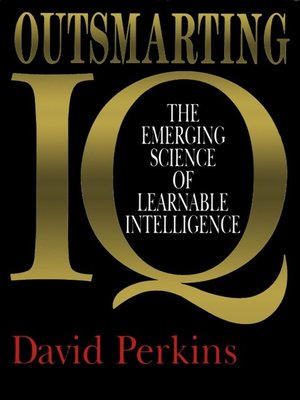
Sign up to save your library
With an OverDrive account, you can save your favorite libraries for at-a-glance information about availability. Find out more about OverDrive accounts.
Find this title in Libby, the library reading app by OverDrive.



Search for a digital library with this title
Title found at these libraries:
| Library Name | Distance |
|---|---|
| Loading... |
Since the turn of the century, the idea that intellectual capacity is fixed has been generally accepted. But increasingly, psychologists, educators, and others have come to challenge this premise. Outsmarting IQ reveals how earlier discoveries about IQ, together with recent research, show that intelligence is not genetically fixed. Intelligence can be taught.
David Perkins, renowned for his research on thinking, learning, and education, identifies three distinct kinds of intelligence: the fixed neurological intelligence linked to IQ tests; the specialized knowledge and experience that individuals acquire over time; and reflective intelligence, the ability to become aware of one's mental habits and transcend limited patterns of thinking. Although all of these forms of intelligence function simultaneously, it is reflective intelligence, Perkins shows, that affords the best opportunity to amplify human intellect. This is the kind of intelligence that helps us to make wise personal decisions, solve challenging technical problems, find creative ideas, and learn complex topics in mathematics, the sciences, management, and other areas. It is the kind of intelligence most needed in an increasingly competitive and complicated world.
Using his own pathbreaking research at Harvard and a rich array of other sources, Perkins paints a compelling picture of the skills and attitudes underlying learnable intelligence. He identifies typical pitfalls in multiple perspectives, and neglecting evidence. He reveals the underlying mechanisms of intelligent behavior. And he explores new frontiers in the development of intelligence in education, business, and other settings.
This book will be of interest to people who have a personal or professional stake in increasing their intellectual skills, to those who look toward better education and a more thoughtful society, and not least to those who follow today's heated debates about the nature of intelligence.
David Perkins, renowned for his research on thinking, learning, and education, identifies three distinct kinds of intelligence: the fixed neurological intelligence linked to IQ tests; the specialized knowledge and experience that individuals acquire over time; and reflective intelligence, the ability to become aware of one's mental habits and transcend limited patterns of thinking. Although all of these forms of intelligence function simultaneously, it is reflective intelligence, Perkins shows, that affords the best opportunity to amplify human intellect. This is the kind of intelligence that helps us to make wise personal decisions, solve challenging technical problems, find creative ideas, and learn complex topics in mathematics, the sciences, management, and other areas. It is the kind of intelligence most needed in an increasingly competitive and complicated world.
Using his own pathbreaking research at Harvard and a rich array of other sources, Perkins paints a compelling picture of the skills and attitudes underlying learnable intelligence. He identifies typical pitfalls in multiple perspectives, and neglecting evidence. He reveals the underlying mechanisms of intelligent behavior. And he explores new frontiers in the development of intelligence in education, business, and other settings.
This book will be of interest to people who have a personal or professional stake in increasing their intellectual skills, to those who look toward better education and a more thoughtful society, and not least to those who follow today's heated debates about the nature of intelligence.







